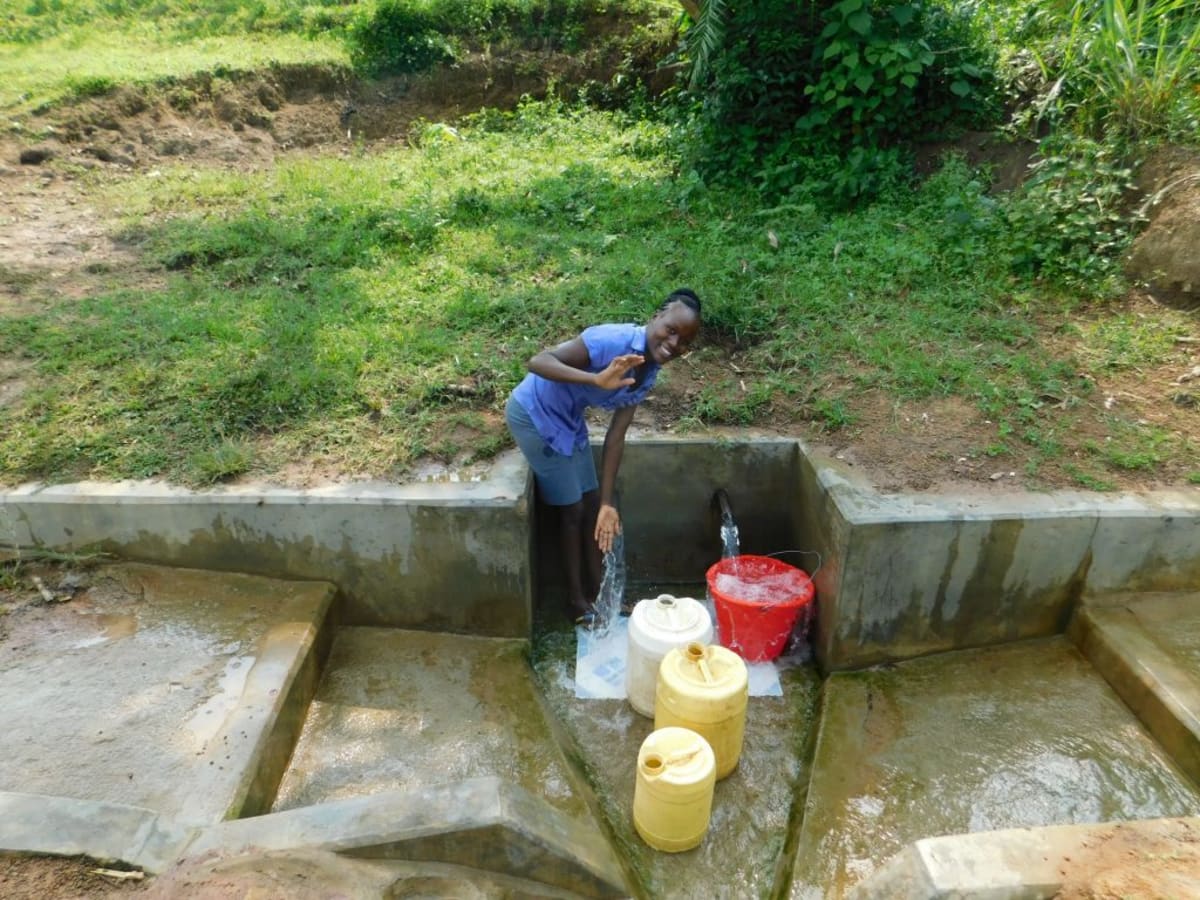Yeni Spring is found at a place called Chegulo in Malava sub-county. This region is occupied by people who speak a Luhya dialect called "Kabras," which is one of the nineteen dialects of the Luhya tribe.
Activities in each homestead seem to be quite similar. This is because they all cultivate sugarcane.
The day begins when every gender in the family is assigned their specific roles. Children are told to fetch water from Yeni Spring. Men have the responsibility of going to the farm while women carry out house chores and goto the market to either sell or buy household items.
They all finish their task and in the evening, then all converge in the sitting room to laugh and chat while waiting for the dinner to be ready.
This location is quite special with how people worship God. Women put on white attire while men put on a white turban locally referred to as "kilemba," which symbolizes inner purity and holiness.
When I looked at the white regalia, I noted that most of it started changing color from white to a creamy yellow. This was an indication that the water they were using to wash is not very clean.
Water
The neighboring community around Timbito Spring had the privilege of getting clean water in the past. This made the community jealous and wish the same clean water solution could be implemented for their spring. They wrote an application letter to us that illustrated their need.
Community members scoop the water using a small container and fill a bigger one. Most of the gathered water is stored in the same jerrycans used to fetch it. The water is exposed to all kinds of pollutants, thus its contamination level is very high.
The majority of people reported having suffered a lot and this is as a result of the consumption of dirty and unsafe water.
"Our health status in this community is wanting," Mrs. Susy Makokha, a community member who uses the spring, said.
"We suffer from water-related diseases, like typhoid and diarrhea. We also suffer due to being ignorant on proper hygiene and sanitation measures."
Water is truly a basic commodity that affects all sectors of our lives and one that we cannot do without it. Protection of Yeni Spring will go a long way in enabling the Kabras people to access to clean and safe water.
Sanitation
More than half of homes have pit latrines. The existing pit latrines are in a poor state. The majority of people lack proper information on hygiene and sanitation, thus they litter the dirt all over the compound thus interfering with the aesthetic value of the environment.
Educating members on the importance of having proper pit latrine will trigger them and enable them to build proper latrines.
Here’s what we’re going to do about it:
Training
Community members will attend hygiene and sanitation training for at least two days. This training will ensure participants have the knowledge they need about healthy practices and their importance. The facilitator plans to use PHAST (Participatory Hygiene and Sanitation Transformation), CLTS (Community-Led Total Sanitation), ABCD (Asset-Based Community Development), group discussions, handouts, and demonstrations at the spring. One of the most important topics we plan to cover is the handling, storage, and treatment of water. Having a clean water source will be extremely helpful, but it is useless if water gets contaminated by the time it’s consumed. Handwashing will also be a big topic.
Training will also result in the formation of a committee that will oversee operations and maintenance at the spring. They will enforce proper behavior around the spring and delegate tasks that will help preserve the site, such as building a fence and digging proper drainage. The fence will keep out destructive animals, and the drainage will keep the area’s mosquito population at a minimum.
Sanitation Platforms
On the final day of training, participants will select five families that should benefit from new latrine floors.
Training will also inform the community and selected families on what they need to contribute to make this project a success. They must mobilize locally available materials, such as bricks, clean sand, hardcore, and ballast. The five families chosen for sanitation platforms must prepare by sinking a pit for the sanitation platforms to be placed over. All community members must work together to make sure that accommodations and food are always provided for the work teams.
Spring Protection
Protecting the spring will ensure that the water is safe, adequate and secure. Construction will keep surface runoff and other contaminants out of the water. With the community’s high involvement in the process, there should be a good sense of responsibility and ownership for the new clean water source.
Fetching water is predominantly a female role, done by both women and young girls. Protecting the spring and offering training and support will, therefore, help empower the female members of the community by giving them more time and efforts to engage and invest in income-generating activities.

 Protected Spring
Protected Spring
 Rehabilitation Project
Rehabilitation Project












































